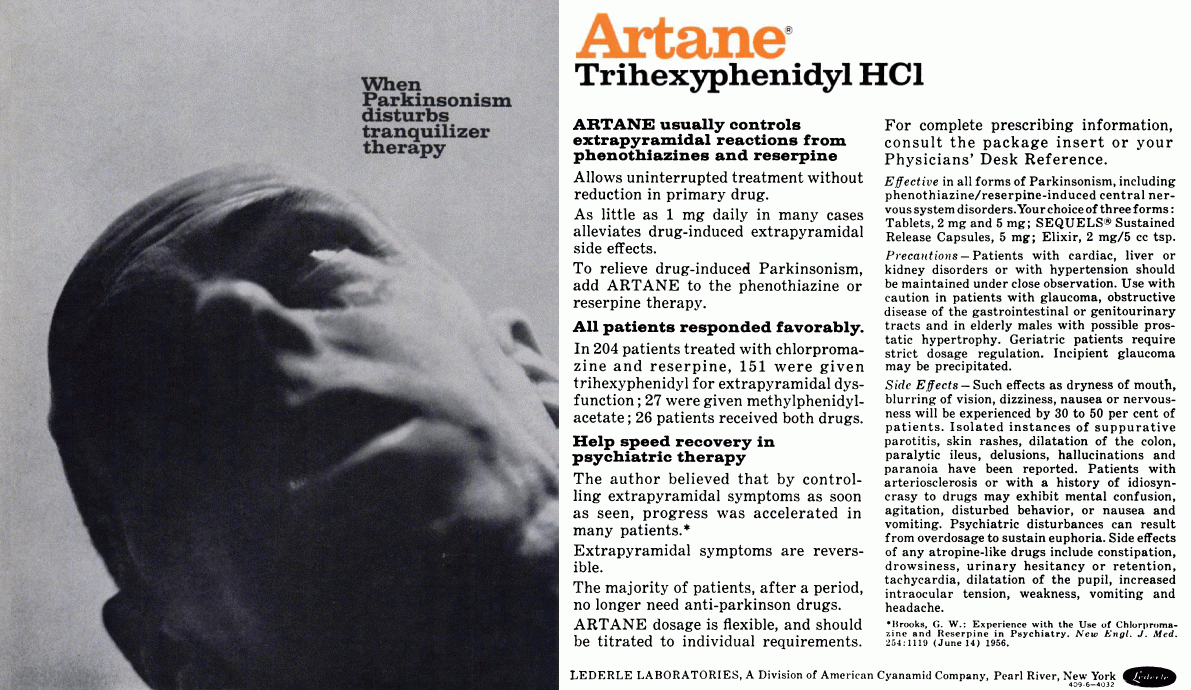

|
|
Artane advertisement, 1967. Hospital & Community Psychiatry, Vol. 18, No. 2. When Parkinsonism disturbs tranquilizer therapy ARTANE® Trihexyphenidyl HCl Artane usually controls extrapyramidal reactions from phenothiazines and reserpine ~ Allows uninterrupted treatment without reduction in primary drug. As little as 1 mg daily in many cases alleviates drug-induced extrapyramidal side effects. To relieve drug-induced Parkinsonism, add Artane to the phenothiazine or reserpine therapy. All patients responded favorably. In 204 patients treated with chlorpromazine and reserpine, 151 were given trihexyphenidyl for extrapyramidal dysfunction; 27 were given methylphenidylacetate; 26 patients received both drugs. Help speed recovery in psychiatric therapy ~ The author believed that by controlling extrapyramidal symptoms as soon as seen, progress was accelerated in many patients.* Extrapyramidal symptoms are reversible. The majority of patients, after a period, no longer need anti-parkinson drugs. Artane dosage is flexible, and should be titrated to individual requirements. For complete prescribing information, consult the package insert or your Physicians' Desk Reference. Effective in all forms of Parkinsonism, including phenothiazine/reserpine-induced central nervous system disorders. Your choice of three forms: Tablets, 2 mg and 5 mg; Sequels® Sustained Release Capsules, 5 mg; Elixir, 2 mg/5 cc tsp. Precautions -- Patients with cardiac, liver or kidney disorders or with hypertension should be maintained under close observation. Use with caution in patients with glaucoma, obstructive disease of the gastrointestinal or genitourinary tracts and in elderly males with possible prostatic hypertrophy. Geriatric patients require strict dosage regulation. Incipient glaucoma may be precipitated. Side Effects -- Such effects as dryness of mouth, blurring of vision, dizziness, nausea or nervousness will be experienced by 30 to 50 per cent of patients. Isolated instances of suppurative parotitis, skin rashes, dilation of the colon, paralytic ileus, delusions, hallucinations and paranoia have been reported. Patients with arteriosclerosis or with a history of idiosyncrasy to drugs may exhibit mental confusion, agitation, disturbed behavior, or nausea and vomiting. Psychiatric disturbances can result from overdosage to sustain euphoria. Side effects of any atropine-like drugs include constipation, drowsiness, urinary hesitancy or retention, tachycardia, dilatation of the pupil, increased intraocular tension, weakness, vomiting and headache. *Brooks, G. W.: Experience with the Use of Chlorpromazine and Reserpine in Psychiatry. New Engl. J. Med. 254:1119 (June 14) 1956. Lederle Laboratories, A Division of American Cyanamid Company, Pearl River, New York |